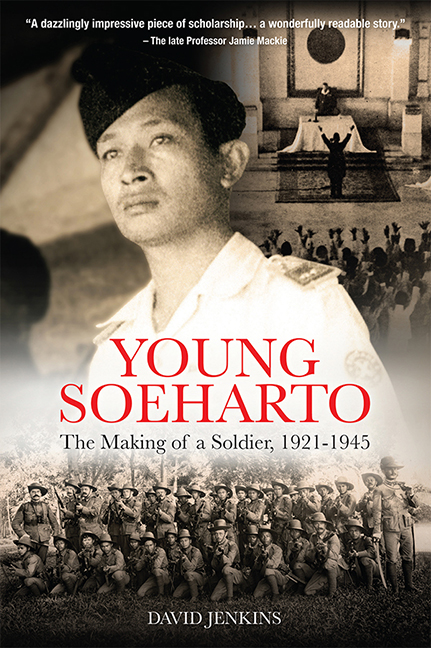Book contents
- Frontmatter
- Contents
- Foreword
- A Note on Spelling and Names
- A Note on Military Organization
- Maps
- List of Charts
- Preface
- Soeharto Family Tree
- 1 “The Sultan came to me and asked about that Family tree”
- 2 “The Cork on which the Netherlands Floats”
- 3 “They Regard Holland as a very Weak Power”
- 4 “An Invisible Motivating Force”
- 5 “What kind of Islam is this?”
- 6 “Soeharto is a Closed Book”
- 7 “I was Suited to the Disciplined life of the Military”
- 8 A Reassuringly Familiar World
- 9 A Policeman for the Japanese
- 10 An Armed Force Conjured out of Nothing
- 11 “The whole Island was Ablaze with Enthusiasm”
- 12 “Don’t make them too Strong!”
- 13 “Soeharto was a Cautious Man”
- 14 “Why did they Choose Soeharto?”
- Glossary and Abbreviations
- Notes
- Acknowledgements
- Bibliography
- Index
- About the Author
6 - “Soeharto is a Closed Book”
Published online by Cambridge University Press: 09 October 2021
- Frontmatter
- Contents
- Foreword
- A Note on Spelling and Names
- A Note on Military Organization
- Maps
- List of Charts
- Preface
- Soeharto Family Tree
- 1 “The Sultan came to me and asked about that Family tree”
- 2 “The Cork on which the Netherlands Floats”
- 3 “They Regard Holland as a very Weak Power”
- 4 “An Invisible Motivating Force”
- 5 “What kind of Islam is this?”
- 6 “Soeharto is a Closed Book”
- 7 “I was Suited to the Disciplined life of the Military”
- 8 A Reassuringly Familiar World
- 9 A Policeman for the Japanese
- 10 An Armed Force Conjured out of Nothing
- 11 “The whole Island was Ablaze with Enthusiasm”
- 12 “Don’t make them too Strong!”
- 13 “Soeharto was a Cautious Man”
- 14 “Why did they Choose Soeharto?”
- Glossary and Abbreviations
- Notes
- Acknowledgements
- Bibliography
- Index
- About the Author
Summary
During his time in Wuryantoro and Wonogiri, Soeharto was exposed more fully to a Javanese philosophy of life. Many of the principles of that philosophy have been distilled into a set of aphorisms; and in later life, Soeharto was to make much of these sayings, which, in his view, embodied eternal truths, although some of the less central points in the canon might be thought so nebulous and so generalized as to be all but meaningless.
One favourite Soeharto aphorism provides guidance on how a person should behave as a member of society. It can be summarized as the “three don’ts”, all of them close in meaning: don't be easily surprised or shocked by anything, but remain calm; don't be overwhelmed by anything or any person; don't act haphazardly (ojo kagetan, ojo gumunan, ojo gugupan). A fourth “don’t” that commended itself to him, and which is a moral command, not behavioural advice, is ojo dumeh, which means “be aware of yourself, who you are.” For example, “Don’t, just because you get promoted, start being arrogant” and “Don’t, just because you are handsome, exploit women.” As Soeharto saw it, these four points made it clear that if one wanted to be successful in society, it was necessary to develop self-awareness and self-confidence. By knowing oneself and being self-assured, one would not be thrown by unexpected developments, nor would one become overbearing and arrogant. These prescriptions, he wrote, “became the guiding principles of life which gave me strength to face problems which otherwise might have shaken me.” The value of this guidance lay, he believed, in its emphasis on instilling the attitudes of patience, fortitude and acceptance of fate, based on self-confidence.
As an army officer and as President, Soeharto seemed to personify a number of these attributes, achieving a state of measured calm and disciplined self-control. But as he got older, and more convinced that he was indispensable, he seemed less able and less willing to cloak a fundamentally arrogant and overbearing nature. In the late eighties, Soeharto invited a large group of people, including all his cabinet ministers and fourteen former student leaders, to the Merdeka Palace to see the film Jakarta ‘66, which focused on the tumultuous events surrounding his rise to power. Afterwards he addressed those present.
- Type
- Chapter
- Information
- Young SoehartoThe Making of a Soldier, 1921–1945, pp. 103 - 123Publisher: ISEAS–Yusof Ishak InstitutePrint publication year: 2021

